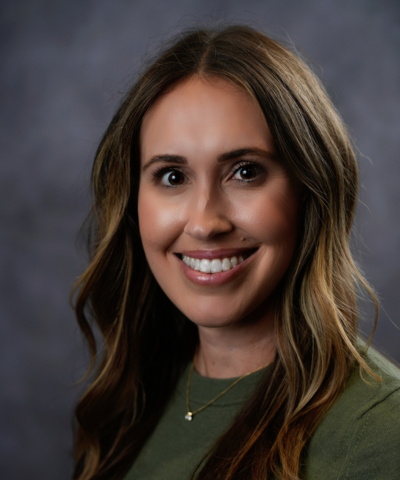
Introduction
Dr. Tiffany Golz, PharmD, BCPP, is a Clinical Psychiatric Pharmacist for Cardinal Health at Arizona State Hospital and Adjunct Assistant Professor at Midwestern University College of Pharmacy. She specializes in the medication management of individuals with serious mental illness, with a focus on schizophrenia and bipolar disorder. Dr. Golz is actively involved in mentoring pharmacy students through precepting, teaching, and student organization advising. She is actively involved in professional organizations, including the American Association of Psychiatric Pharmacists (AAPP), the Arizona Pharmacy Association (AzPA), and the National Alliance on Mental Illness (NAMI). Dr. Golz earned her PharmD from Midwestern University and is committed to advancing compassionate, evidence-based care for individuals diagnoses with mental illness.
Why Pharmacy
My interest in pharmacy was first sparked during a high school chemistry class, where we synthesized aspirin in a lab. I was fascinated by the idea of turning simple ingredients into something that could help people feel better. At the time, I didn’t fully understand the pharmacist’s role, but I knew I wanted to work in healthcare. That drive was partly inspired by my grandfather, a beloved community physician known for making house calls. A conversation with a pharmacist in my family helped me realize that this career offered the perfect blend of science, critical thinking, and meaningful patient care. Years later, I was introduced to psychiatric pharmacy, a specialty that aligned with my clinical interests and allowed me to make a lasting impact on the lives of individuals with serious mental illness.
Career Journey
I started as a pharmacy clerk at a national drugstore during college, just to test the waters—and I loved it. The regular patients, the fast pace, and the team of kind, dedicated pharmacists made it easy to picture myself in the field. I eventually became a pharmacy technician while finishing my degree in Biological Sciences, which gave me great real-world experience (and a solid college-kid paycheck).
After graduating, I spent two years completing prerequisites before being accepted into Midwestern University’s accelerated 3-year PharmD program in Glendale, Arizona. Moving out of state was a leap, but I’ve now called Arizona home for over 15 years.
My first clinical rotation at Arizona State Hospital introduced me to psychiatric pharmacy, and it changed everything. I discovered how impactful a pharmacist can be when serving individuals with serious mental illness in a long-term inpatient setting. These are some of the most vulnerable patients in our healthcare system, and I knew I wanted to be part of their care. I stayed connected with my preceptors, and after graduation, returned to the hospital as a staff pharmacist. Four years later, I became board-certified in psychiatric pharmacy, which strengthened my clinical expertise and enhanced my ability to advocate for safe, effective treatment plans tailored to this complex population.
Current Role and Responsibilities
A typical day starts off with a team huddle where pharmacists and pharmacy technicians sync up on what’s ahead. I also precept student pharmacists, so I check in with them to prioritize their day. My work involves reviewing labs and patient charts, consulting with prescribers and nurses, leading medication education groups, and managing medication orders.
Outside the hospital, I stay involved in academia as a course instructor and faculty advisor for the American Association of Psychiatric Pharmacists (AAPP) student chapter at Midwestern University. I enjoy bridging the hospital and academic worlds, as it keeps things dynamic and gives me the chance to mentor future pharmacists.
Challenges
One of the most challenging aspects of my career is advocating for mental health care in a system where funding and recognition often fall short. Despite progress, psychiatric care still struggles to receive the same level of attention and resources as other areas of medicine. It’s a constant reminder that there’s still work to be done and that pharmacists can be impactful in driving that change.
Rewards
Helping patients with complex mental health needs is incredibly meaningful. For instance, a patient on a complicated antipsychotic regimen was experiencing significant side effects, but the connection hadn’t been made by the treatment team. I reviewed his chart, identified potential interactions and duplications, and recommended a simplified approach. The team implemented the changes, and within weeks, his symptoms improved. He was more alert, sleeping better, and even participating in group therapy. Seeing that transformation reminded me just how much impact thoughtful medication management can have. Psychiatric pharmacists truly play a key role in making sure medications are used safely, effectively, and thoughtfully. And over time, I’ve built stronger relationships with prescribers, which has led to more collaborative and productive conversations about medication decisions.
Work/Life Balance
I’m fortunate to have a role that supports a healthy work-life balance. For me, time and mental bandwidth mattered more than a bigger paycheck that came with longer hours. I’ve stayed in this position for 10 years because it allows me the space to enjoy life, stay active in professional organizations, volunteer, and travel. The key is figuring out what matters most to you and finding a role that supports those priorities.
Advice for Students and Aspiring Professionals
Pharmacy is one of the most flexible healthcare careers out there. You can work in a hospital, clinic, community pharmacy, research lab, to name a few. My advice is to keep an open mind. You never know what will inspire you until you try it. I thought I’d work in retail pharmacy forever and then one student rotation totally changed my path.